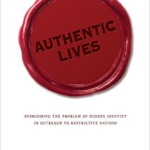 By Thomas Hale III, William Carey Library, 2016
By Thomas Hale III, William Carey Library, 2016
A BOOK REVIEW by Phill Sandahl:
Should believers lie, or use deception, in order to take the gospel to restrictive or hostile countries? This is an issue that comes up frequently in discussions of tentmaking. I have faced strong believers who argue passionately on both sides of this debate. Each claims biblical support for their point of view.
Authentic Lives tackles this topic with more depth and insight than I have seen before.
The book is a serious, deep, and thorough exploration into the issue. Exploring all sides and the pro and con consequences for each party with each approach. Hale explores both the effects and the unintended consequences of every approach. He does not go easy on either side, revealing potential negative effects with each approach. Nor is he judgmental condemning one side or the other for their choice. Each context is different and each person has to make the best choice possible.
Hale employs the literary device of creating a fictitious state of “Almoria” which is a composite of real places and real people where ministry takes place in countries with few Christians and restrictive governments. This way he can explore the issues without singling out specific countries or people.
His analysis ranges wide. He looks at the cases and approaches through various lenses — historical, governmental, anthropological-sociological, political and theological.
Through the use of case studies, from contemporary accounts and biblical stories he delves into issues of deception and integrity. He draws out practical lessons that will help future ex-pats living in restrictive countries.
A common practice is to have different identities (explanations of one’s activity) based on the audience one is addressing – home church or host country. He demonstrates the difficulty of this “schizophrenic” approach even when both explanations may be true.
Having laid out the problems with each method, Hale proposes an alternative approach which allows one to operate with integrity before all groups in an authentic way. His recommendation is not without its detractors. In some cases it will be necessary to “re-educate” your support group.
He challenges some of the presuppositions of the past. Nevertheless, he gives an approach which is biblical, practical, and worthy of consideration. He shows how one can be consistent and present one identity to all constituents without compromise.
IN CONCLUSION he writes: “In summary, the best way for a sent one to avoid a hidden identity in Almoria is to adapt purpose, metaphor, and motivation such that nothing needs to be hidden.” Pg. 72. Be who God made you to be. Be Authentic.
Years of study combined with experience in the field have equipped the author to produce a valuable guide for the tentmaker. This book helps to better understand the tentmaker role while working in challenging and restrictive countries.
I recommend this book to anyone interested in sharing his life along with his faith whether he is going to another country or just being more missional and authentic in his homeland.
# # #
ABOUT THE AUTHOR. “Thomas Hale III lived twelve years in Nepal and India as the son of missionary doctors. He worked nineteen years in the former Soviet Union, ten of those in NGO leadership.” He is an alumni of Global Opportunities training course. Authentic Lives is available from William Carey Library and Amazon